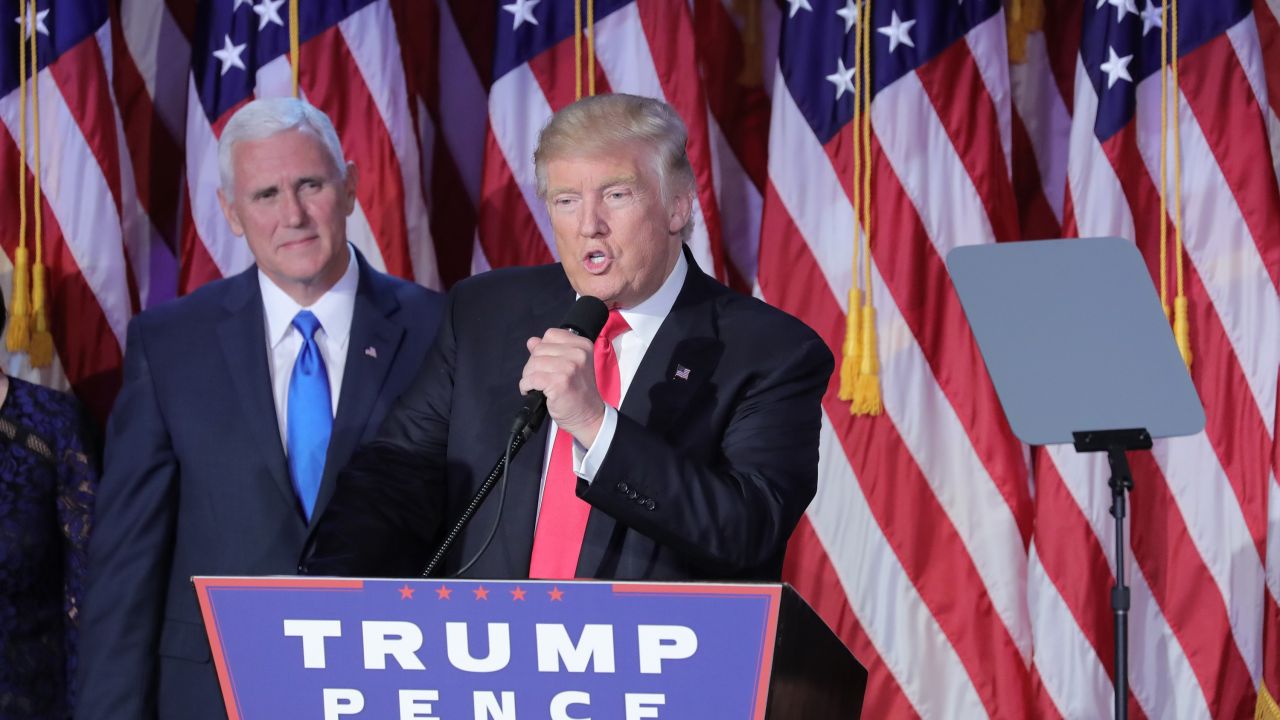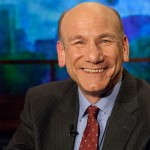
Presidential elect Donald J. Trump speaks on stage at his election night event at The New York Hilton Midtown on November 8, 2016 in New York City. (Photo by Neilson Barnard/WireImage)
This post originally appeared at The Jewish Journal.
In her Clinton wardrobe and hair, accompanying herself on the piano, Kate McKinnon’s cold open of the Saturday Night Live after Election Day was a dirge for the loss of Leonard Cohen, for the loss of Hillary Clinton and for the lost Americans now struggling for hope and direction.
“… And even though
It all went wrong
I’ll stand before the Lord of Song
With nothing on my tongue but Hallelujah”
After the song’s last Hallelujah, eyes moist and voice husky, McKinnon/Clinton answered the plea in the hearts — “Comfort me” — and the question in the minds — “Now what?” — of more than 60 million citizens. “I’m not giving up,” she said, “and neither should you.”
What is good citizenship, what is true patriotism, at this disorienting moment in our history? Trump’s victory speech and Clinton’s concession both called on us to come together. The day after the election, President Obama said “we are now all rooting for his success in uniting and leading the country.” Really? Who are we supposed to be uniting with? Where does Trump want to lead us?
Well, look where he’s led us so far. He’s already pissed on the presidency (vulgar words, I know, but what else is birtherism?); he’s already normalized hate (what else does his political incorrectness amount to?); he’s already sanctioned evil (what else is climate change denial, or torture?). With congressional cowards abdicating checks and balances, with a Fourth Estate little more inclined to challenge authoritarianism than an infotainment freak show, with global adversaries playing his ignorance and narcissism like a piccolo, it’s easy to imagine President Trump leading us straight to tragedy. Is that what we’re supposed to root for?
What’s not easy, what’s so hard about “I’m not giving up,” is uniting. Some 60 million voters, their power eccentrically amplified by the Electoral College, sent Trump on his way to the White House. Who are they? Who are my brothers and sisters in democracy?
Some are casualties of policies that have hollowed out the middle class and redistributed wealth upward, victims of representatives who have obstructed all attempts to secure their freedom of economic opportunity. Some believe that plutocrats and their Washington flunkies have corrupted our politics and taken our government hostage. Some feel ignored, disrespected and betrayed and they see in Trump (and saw in Bernie Sanders) the detonator of a Great Disruption of the capital’s ruling class.
I’ve got plenty of cause to unite with them. If they and the president they elected want to push for the most sweeping campaign finance reform and the most ambitious anti-corruption measures ever enacted, count me in.
But other Trump voters are white supremacists, anti-Semites, Islamophobes, misogynists, homophobes — enemies of American pluralism scarily mobilized by Trump’s tolerance of intolerance. I don’t want to unite with them, I want to ostracize and disempower them.
What makes it hardest for me to root for Trump’s success is his commitment to policies I believe are inherently immoral. Undoing the Paris climate change accord and unleashing the fossil fuel industry amounts to planetary suicide. Taking women’s reproductive rights away amounts to sending poor women to the butcher. Murdering the families of our enemies is barbaric. These aren’t the kind of policy differences you negotiate, use as bargaining chips, fold into a deal or put to a vote. They’re foundational principles of a good society.
When a man is diagnosed with prostate cancer, if it’s not metastasizing, one of his options — a choice short of surgery or radiation — is “active surveillance.” You monitor the disease vigilantly. You’re prepared to excise or nuke it at a moment’s notice, but watchful waiting is the baseline.
I think that’s where we are with Trump: watching for tumors (Steve Bannon), waiting for remission (gay marriage). Since the election, Trump has hedged on campaign promises like building a border wall, banning Muslims and expunging Obamacare. I bet a lot of Clinton voters are fantasizing that Trump will reveal himself to be more of a compromiser and less of a sociopath than he’s so far given us reason to think. To encourage that, peaceful and proliferating demonstrations may be a better tactic than singing kumbaya with his supporters, and pretending he’s an avid learner may be a shrewder move than treating him like an irredeemable ideologue.
After the election, my synagogue’s leaders made a special effort to invite congregants to Friday night Shabbat services as a way for our community to console, lift and listen to one another. Some 300 people turned out, more than double what’s usual, including many children, teens and young adults. When we arrived we found a handout on our chairs: the lyrics to Cohen’s Hallelujah. We sang it at the beginning, among the psalms. In the middle of the service, after his sermon, our rabbi passed a microphone for people to say what they were feeling. I heard fear, I heard hope, I heard calls to action.
At the very end of the service, our cantor surprised us. She asked us to please turn to page 300-something and join in singing America the Beautiful. I didn’t even know it was in the prayer book. Nor, I suspect, did anyone else.
United in song, we staked our claim to patriotism. We took our country back. We sang to one another, in essence, I’m not giving up, and neither should you. By the time we got to “Thine alabaster cities gleam / Undimmed by human tears,” my eyes were welling up. When we reached “From sea to shining sea,” I almost lost it.
But looking around me, I saw I wasn’t alone. And neither are you.




